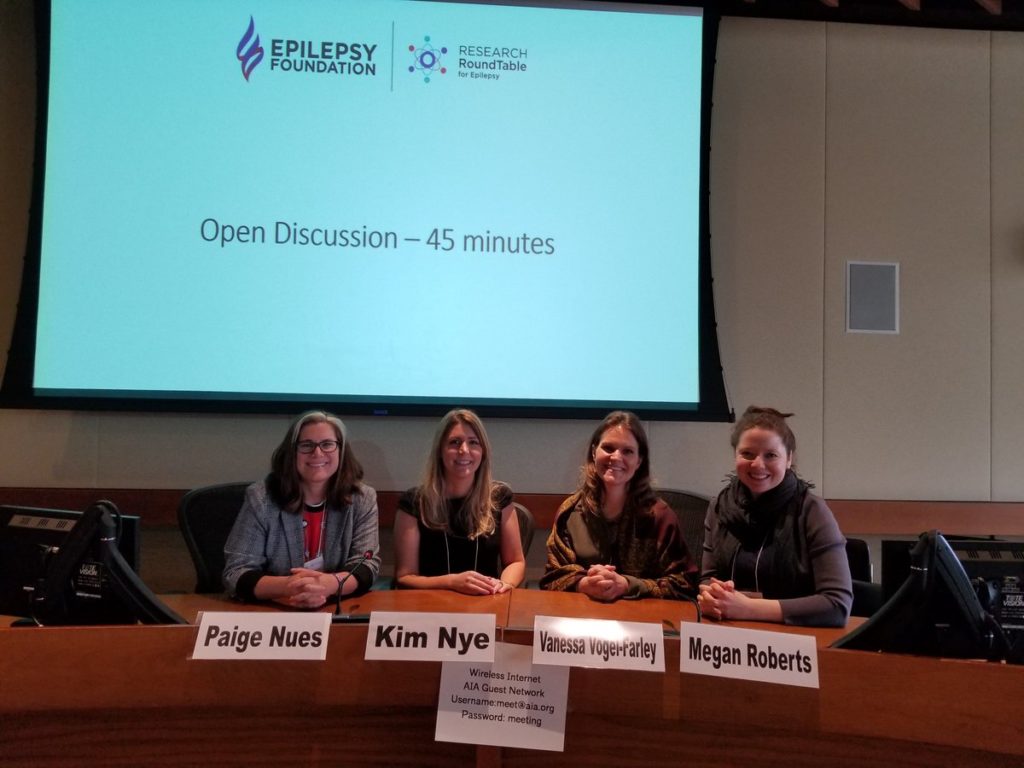KCNQ2 Cure Alliance Joins Epilepsy Foundation Research Roundtable
By Scotty Sims on April 2, 2019

Share
On March 21-22, I had the opportunity to represent the KCNQ2 Cure Alliance at the 2019 Research Roundtable for Epilepsy organized by the Epilepsy Foundation. Now in its fourth year, the annual meeting brings together patient advocacy organizations with leading epilepsy experts from research organizations and pharmaceutical companies with regulators from the Food and Drug Administration and the European Medicines Agency to tackle critical questions around advancing epilepsy treatments. This year, we joined forces with leading voices from other rare diseases, including Dup15q Alliance, Rett Syndrome Foundation, and the TESS Research Foundation to share our reflections on behalf of the rare disease community.
This year, discussions zeroed in on critical challenges and questions around clinical trials. Trials are a major milestone in the development of new drug therapies. They ensure that new compounds work as expected, help to determine dosages, and reveal potential side effects. But they also present some challenges for rare diseases. Is it ethical to use a placebo for a severe rare disease? How can you complete a timely trial when it is difficult to recruit enough patients to study the drug?
The caregiver panel helped to set the stage for the discussions by focusing on how patient communities think about trials, and what considerations affect participation. I shared with the group some aspects of KCNQ2 that may make clinical trials more challenging, including the spectrum of seizure burdens (across children but also over time) and developmental outcomes. And although our community would welcome more effective seizure medicines with fewer side effects, I emphasized our interest in identifying and advancing treatments for all aspects of KCNQ2 encephalopathy. Other discussions focused on different types of trials, how to approach seizure counting during trials, and considerations about dosing.
All of these issues are incredibly important for our community and the discussions were timely given the exciting progress we are seeing in the development of new treatments for KCNQ2. Later this year, Xenon Pharmaceuticals will enter a Phase 3 trial, the first with KCNQ2 children, to test its drug therapy, XEN496, which is a pediatric formulation of ezogabine, previously marketed under the name Potiga. Although Potiga had some important potential side effects, this drug was used with success by KCNQ2 children, before it was taken off the market in 2017. In parallel Xenon is also developing a second potassium channel modulator, called XEN1101, which is expected to enter Phase 2 trials later this year.
And earlier this year, Knopp Biosciences announced a new collaboration with Ed Cooper at Baylor University. Knopp has a number of drug compounds that are designed to activate the potassium channel in the brain and will work with Dr. Cooper’s lab to learn whether these compounds could be used as successful treatments for KCNQ2 epilepsy.
We’re working closely with our partners to make sure that our community is ready to support and participate in trials to advance treatments for KCNQ2 epilepsy, including through our natural history study led by Dr. Ann Poduri at Harvard and Boston Children’s Hospital, the Early Recognition of Genetic Epilepsy in Neonates (ERGENT) program to provide free testing to infants suspected to have KCNQ2, and working closely with other efforts including a new Center Without Walls epilepsy program that will be led by Al George at Northwestern University.
We know that together with our partners we have a long way to go in our journey to a cure for KCNQ2 encephalopathy, but with each step we remember, “If you want to go fast, go alone. If you want to go far, go together.” Please join us.
